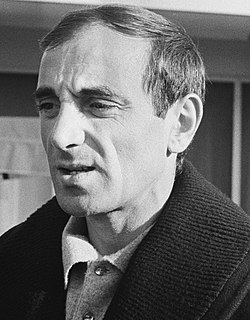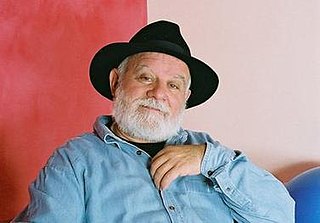
Charles Aznavour was a French-Armenian singer, lyricist, and diplomat. Aznavour was known for his distinctive tenor voice: clear and ringing in its upper reaches, with gravelly and profound low notes. In a composer/singer/songwriter career spanning over 70 years, he recorded more than 1,200 songs interpreted in nine languages. Moreover, he wrote or co-wrote more than 1,000 songs for himself and others.

Serj Tankian is a Lebanese-born Armenian-American musician, singer, songwriter, multi-instrumentalist, record producer, poet and political activist. He is best known as the lead vocalist, songwriter, keyboardist, and occasional live rhythm guitarist of the band System of a Down, formed in 1994.
Change or Changing may refer to:
Armenia is a country in the South Caucasus region of Eurasia.

Athanasios "Thanos" Mikroutsikos is a Greek composer and former politician. Although he is never billed as a singer, he has sung many songs. He is considered one of the most important composers of the recent Greek musical scene.
Manos Loïzos was one of the most important Greek Cypriot music composers of the 20th century.

Rock and roll spread around the world in the 1950s and 1960s, entering Greece in the middle of the 1960s. Greek rock performers in the field include Kostas Tournas, Jimi Quidd, and Pavlos Sidiropoulos, the most important representative of Greek folk-rock and rock.
Nikolas Asimos was a Greek composer and singer. His real surname was Asimopoulos (Ασημόπουλος). Asimos was a very special case of a counter-culture artist, mostly because of his lifestyle. His behaviour and songs were often received as provocative by the general public. He was a person with strong political opinions. Ideologically, he could be categorised as an anarchist but he never accepted being put in a specific political ideology.
Papakonstantinou is a Greek surname. It is the surname of:

Evridiki Theokleous, known professionally as simply Evridiki, is a Greek Cypriot rock, pop, and electropop singer. She is best known in Europe for representing her home country, Cyprus, in the Eurovision Song Contest in 1992, 1994 and 2007 with the songs Teriazoume, Eimai Anthropos Ki Ego and Comme Ci, Comme Ça, respectively.

Lavrentis Machairitsas is a Greek rock musician from Volos, Thessaly, Greece.
Sari Gelin Azerbaijani: Sarı Gəlin ساری گلین; Persian: دامنکشان Dāman Kešān; Turkish: Sarı Gelin; Armenian: Սարի աղջիկ Sāri Āγčīk) is the name for a number of folk songs popular among the people of Iran, the southern Caucasus and eastern Anatolia. All versions of the song use the same melody and are written in the Bayati makam or mode; but sing different lyrics. The consensus about its country of origin is contested.

Siranush Harutyunyan, known professionally as Sirusho, is an Armenian singer whose musical career has been active for over 20 years. Her musical style reflects the Armenian traditional sounds mixed with modern music. Sirusho received her first award when she was nine years old for her song "Lusabats". Sirusho's first studio album, Sirusho, was released in 2000; her second album Sheram was released in 2005. In the same year, she was awarded The Future of Armenian Music, Best Album and Best Female Performer awards in the first Armenian National Music Awards.

Apagorevmeno is Greek singer Anna Vissi's 25th studio album, released in Greece and Cyprus on December 9, 2008 by Sony BMG Greece. It is Vissi's first studio album since 2005 and the first since her 1981 self-titled album to not include any songs or input by Nikos Karvelas. The album was mostly produced with the Maple Jam Music Group in Los Angeles, United States, and by its head producer Greg Ladanyi.
ONAR, composed of Lefteris Pliatsikas and Penny Ramadani, is a renowned Greek pop rock group. The band's name seems to be a reference to the ancient Greek word ὄναρ "dream".

Pyx Lax was a Greek rock band. Originally formed in 1989, they released their first recording in 1990, and had a critical and commercial success in the Greek music industry for fifteen years, before being dissolved in 2004. They are considered as the most successful, commercially, group in the history of Greek discography with three gold and five platinum albums. Some of their greatest hits were: "De Tha Dakryso Pia Gia Sena", "Ti Ine Afto Pou Mas Enoni?", "I Palies Agapes Pane Ston Paradeiso", "Mia Synousia Mystiki", "Epapses Agapi na thymizeis", "Poula me", and "Monaxia mou ola.

Emmanouil (Manolis) Rasoulis, best known as the lyricist of famous songs, was a Greek music composer, singer, writer, and journalist.
Vasilis Papakonstantinou is the eponymous debut album from Vasilis Papakonstantinou. It was recorded after his return from touring abroad as a singer for Mikis Theodorakis's tour. Most of the songs for the album are originals written by singer-songwriter Antonis Vardis with lyrics by Panos Falaras. The album also includes the first attempt as a songwriter by the popular singer Haris Alexiou. The remaining songs are covers: two by Catalan singer-songwriter Lluis Llach with Greek lyrics by Falaras, a song by singer-songwriter Dionysis Savvopoulos, a Thanos Mikroutsikos song, and a Mikis Theodorakis song.

Atreides is Yannis Zouganelis' third studio album. The album contains songs written for the play of the same name which was a "montage of Greek tragedies based on the myth of the House of Atreus". The play included pieces from Oresteia by Aeschylus, Electra by Sophocles, and Iphigenia at Aulis, Iphigenia in Tauris, and Orestes by Euripides translated and adapted from the Ancient Greek by Kostas Myris, who also wrote the lyrics of the songs which were sung by Vasilis Papakonstantinou. The play was performed by "Theatro Erevnas" of Dimitris Potamitis at the Mount Lycabettus theatre in Athens and later broadcast by the Greek national television ERT on 12 November 1979.













